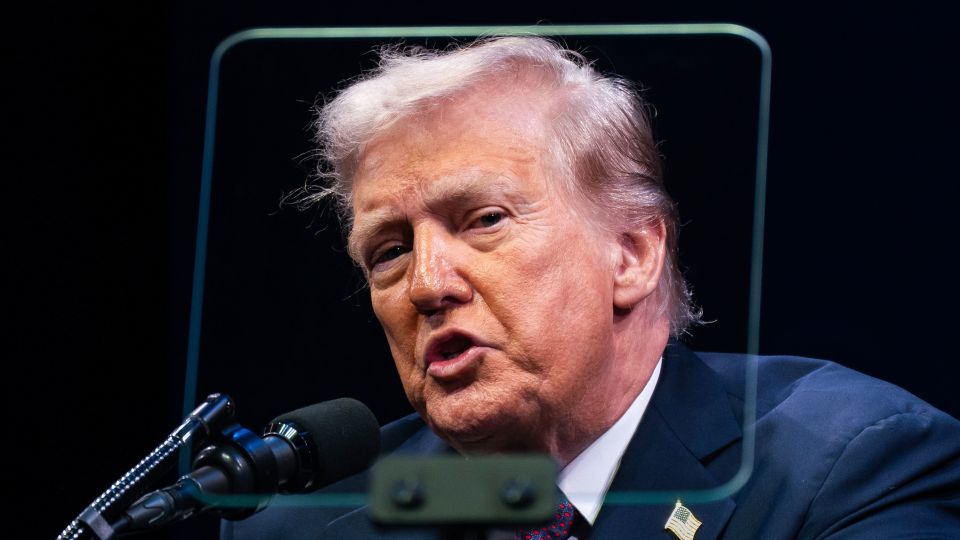President Donald Trump is aiming to ramp up scrutiny on pharmaceutical ads — both on TV and social media — as his administration accuses companies of misleading the public about medications and their side effects.
A directive Trump signed Tuesday tasks the US Department of Health and Human Services and other agencies with greater enforcement of existing regulations governing direct-to-consumer drug advertising that administration officials say companies have increasingly flouted in recent years.
In another potentially significant move, administration officials said the US Food and Drug Administration will craft new regulations that would effectively eliminate a decades-old provision that officials have blamed for fueling an explosion of drug ads on television and elsewhere.
It’s another attempt by Trump to follow through on his long-held pledge to crack down on the pharmaceutical industry. His administration is already pushing drug makers to sell more of their products directly to consumers, in an effort to lower prices. Trump wrote a letter to 17 drug company CEOs in July directing them to participate in programs to sell certain drugs directly to consumers or business at “Most Favored Nation” prices, a phrase that refers to the lowest price paid for a drug in a peer country.
Health and Human Services Secretary Robert F. Kennedy Jr. has also made it clear he is no fan of drug ads on TV, posting on X last year that he would seek to ban pharmaceutical advertising if Trump won the election.
The memorandum stops well short of seeking a total prohibition. But administration officials earlier on Tuesday argued that the effort to bolster enforcement and eventually require more extensive disclosures amounted to the “strongest, boldest action that we can take” to ensure “patients have adequate safety information on pharmaceutical ads.”
Current regulations specify that drug ads cannot create a “misleading impression” and must provide a “fair balance” of information. But FDA enforcement in recent years has been lax, a senior administration official told reporters ahead of the Oval Office announcement. Only one enforcement letter was sent in 2023, and none were issued last year.
The FDA is issuing about 100 cease-and-desist enforcement letters and thousands of warning letters to companies on Tuesday, informing them that it plans to enforce existing regulations, the official said. They declined to name any of the companies receiving letters, but pointed to a Super Bowl ad for weight loss drugs — which drew criticism from senators and others for not including safety and side effect information — as one example of the problem.
Also, the agency will expand its oversight to social media platforms, including social media influencers who may be paid to promote drug products without providing proper disclosures or following the same rules as drug makers.
“People are seeing ads sometimes not even realizing that they’re pharmaceutical ads when a paid social media influencer is touting a product,” the senior official said. “They’re seeing ads that have zero mention of any side effects, even though there are very real side effects.”
Plus, the administration plans to issue new regulations to close a provision created in 1997 that permitted pharmaceutical companies to include only a short overview of a drug’s side effects in their advertisements, so long as consumers were directed to a fuller rundown published elsewhere. That change, Trump administration officials said, drove a sharp increase in pharmaceutical marketing because it allowed companies to more easily create shorter television spots.
Officials offered few specifics on what exactly the overhaul would look like, or whether the goal was to effectively make it impossible for drug companies to advertise on television. But the second senior administration official said that the regulations would require companies to make far more extensive disclosures.
“Absolutely the ads will need to be longer,” the second official said.
The Pharmaceutical Research and Manufacturers of America, a leading trade group, said that direct-to-consumer advertising gives patients information they need to make informed decisions about their care in consultation with their doctors.
“Truthful and non-misleading DTC advertising is protected under the First Amendment and has documented evidence of advancing patient awareness and engagement,” Alex Schriver, senior vice president at PhRMA, said in a statement.
This is not the first time Trump has directed his attention to drug advertisements. During his first term, a federal judge nixed the administration’s effort to require drug makers to include their list prices in TV ads, saying HHS had overstepped its authority.
TV ads are a key way for pharmaceutical companies to raise awareness of their products, though some physicians say the spots can provide patients with misleading information.
Drug makers spent a whopping $5.15 billion on national TV ads in 2024, according to research firm eMarketer. They continued to open their wallets in 2025, spending just shy of $3 billion on national TV ads during the first half of the year, a 12.2% year-on-year increase.
The health care and drug industry is currently No. 4 in terms of total TV ad spending by industry, accounting for 11.1% of the market, according to eMarketer data shared with CNN.
CNN’s Liam Reilly contributed to this report.
For more CNN news and newsletters create an account at CNN.com

